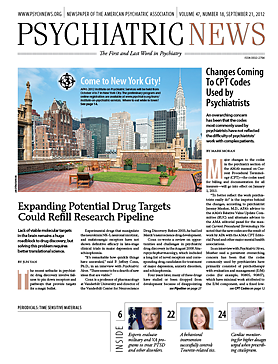Aspirin might be an effective means of preventing depression in older men with high levels of the amino acid homocysteine in the blood.
This intriguing idea was suggested by data from a large cross-sectional study by Osvaldo Alemeida, M.D., Ph.D., chair of geriatric psychiatry at the University of Western Australia, and colleagues and reported August 14 in Translational Psychiatry.
The study included some 3,700 men aged 69 to 87, 42 percent of whom were using aspirin to prevent or treat cardiovascular disease, 25 percent of whom had at least moderately elevated homocysteine levels (at least 15 u mol/L), and 14 percent of whom showed evidence of current or past depression according to the Geriatric Depression Scale and several interview questions.
The researchers found that subjects with at least moderately elevated homocysteine levels who used aspirin had a significantly lower risk of depression than did subjects with equivalent homocysteine levels who did not use aspirin, even when possibly confounding factors such as smoking and antidepressant use were considered.
Thus it looks as if aspirin might be able to help prevent depression in older men who have high blood levels of homocysteine.
Confirmation Awaits Further Studies
The only way to know whether such an approach is truly an effective depression-prevention strategy, of course, is to conduct a randomized, placebo-controlled trial. “We are hoping to undertake such a trial, and we expect preliminary results in three to four years,” Alemeida told Psychiatric News.
When asked how older men can learn whether they have high plasma homocysteine levels, Alemeida noted that only a blood test can provide this information, but such a test is not part of a routine examination.
He pointed out in addition that there is no reason to believe that aspirin might prevent depression in older men without high homocysteine levels. “Our data would not support such a hypothesis—the effect of aspirin on the risk of depression among older people with normal homocysteine was simply nonexistent.”
“Broadly, this appears to be a competent and reasonably done study, but really should be viewed as hypothesis-generating rather than as something that should guide clinical decisions,” Warren Taylor, M.D., an associate professor of clinical psychiatry at Vanderbilt University and a geriatric psychiatrist, said in an interview.
“I think that there are a lot of good reasons why older men might benefit from aspirin, but based on the current study, I can’t say that taking an aspirin a day would prevent depression. Aspirin—although widely used—does have risks of bleeding, so it’s not like this is a risk-free intervention. That being said, we know that there’s a relationship between high levels of homocysteine and vascular disease and between cardiovascular disease and depression. Many individuals with vascular disease may need an anticoagulant like aspirin. If it benefits their physical health, and has a possible benefit for their mental health, then even better.”
Is There a Dose-Response Link?
“This is an intriguing study,” Olivia Okereke, M.D., a geriatric psychiatrist and an assistant professor of psychiatry at Harvard Medical School, commented. “There is a strong conceptual basis to the links between high homocysteine and risk of depression. So, looking at whether there is something that can modify that risk is worthwhile. [But] cross-sectional studies like this one always have important caveats. For example, one cannot tell whether there is a temporal association between taking aspirin and having depression among persons with high homocysteine.”
“[Also,] details were not included on the dosing of aspirin,” Okereke noted. “It would be interesting to see whether there is a dose-response connection between aspirin and depression among people with high homocysteine. A key question is, ‘What dose of aspirin is needed to observe these findings?’ This is important because aspirin can have dangerous side effects, including risk of bleeding. Regular use of higher doses of aspirin is not an option for many people.”
She added that “the authors wisely remind readers that their results need to be followed up with a randomized trial.”
The study was funded by the National Health and Medical Research Council of Australia.

